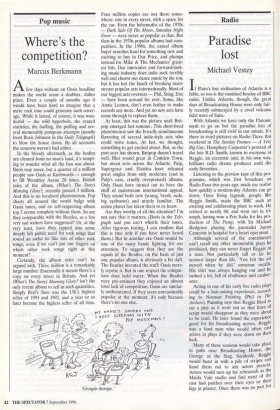Pop music
Where's the competition?
Marcus Berkmann
Afew days without an Oasis headline makes the world seem a drabber, duller place. Even a couple of months ago it would have been hard to imagine that a mere rock tour could generate such cover- age. While it lasted, of course, it was won- derful — the wild hyperbole, the crazed statistics, the huffing, the puffing and sev- eral memorably pompous attempts (mostly from Boris Johnson in the Daily Telegraph) to blow the house down. By all accounts the concerts weren't bad either.
In the bloody aftermath, as the bodies are cleared from no man's land, it's tempt- ing to wonder what all the fuss was about. Boris may sneer, but a quarter of a million people saw Oasis at Knebworth — enough to fill Wembley Arena 20 times. British sales of the album, (What's The Story) Morning Glory?, recently passed 3 million. And this is no localised phenomenon. Pop charts all around the world bulge with Oasis tunes, and no self-respecting album top 5 seems complete without them. So are they comparable with the Beatles, as a few very sad writers have suggested? Or, at the very least, have they tapped into some deeply felt public need for rock songs that sound an awful lot like lots of other rock songs, even if we can't put our fingers on which other rock songs right at this moment?
Certainly, the album sales can't be argued with. Three million is a remarkably large number. Essentially it means there's a copy on every street in Britain. And yet (What's The Story) Morning Glory? isn't the only recent album to sell in such quantities. Simply Red's Stars was the UK's highest seller of 1991 and 1992, and a year or so later became the highest seller of all time. Four million copies are out there some- where: one in every street, with a spare for the car. Even the behemoths of the 1970s — Dark Side Of The Moon, Saturday Night Fever — were never as popular as that. But then in the 1970s popular albums had com- petition. In the 1990s, the casual album buyer searches hard for something new and exciting to buy in Our Price, and plumps instead for Mike & The Mechanics' great- est hits. Our innovative and forward-look- ing music industry does indie rock terribly well and chums out dance music by the ton, but it has lost the knack of breaking main- stream popular acts internationally. Most of our biggest acts overseas — Phil, Sting, Eric — have been around for ever. Some, like Annie Lennox, don't even bother to make records any more. And yet no new acts have come through to replace them.
At least, this was the picture until Brit- pop emerged last summer. This short-lived phenomenon saw the broadly simultaneous flowering of several indie-style acts who could write tunes. At last, we thought, something to get excited about. But, as the past year has shown, Britpop doesn't travel well. Blur sound great in Camden Town, but mean zero across the Atlantic. Pulp, Supergrass and Elastica have released great singles from only moderate (and in Pulp's case, cruelly overpraised) albums. Only Oasis have turned out to have the stuff of mainstream international appeal. They sound both new (young, brash, rude, big eyebrows) and utterly familiar. The entire planet has taken them to its heart.
Are they worthy of all this attention? I'm not sure that it matters. (Boris in the Tele- graph said you can't whistle their tunes. After rigorous testing, I can confirm that this is true only if you have never heard them.) But in another era Oasis would be one of the many bands fighting for our attention. To suggest that they are the equals of the Beatles, on the basis of just one popular album, is obviously a bit daft. The Beatles invented the stuff; Oasis mere- ly reprise it. But in one respect the compar- ison does hold water. When the Beatles were pre-eminent they enjoyed an almost total lack of competition. Oasis are similar- ly unthreatened. If they seem unreasonably popular at the moment, it's only because there's no one else.
'Groupie therapy.'


























































 Previous page
Previous page